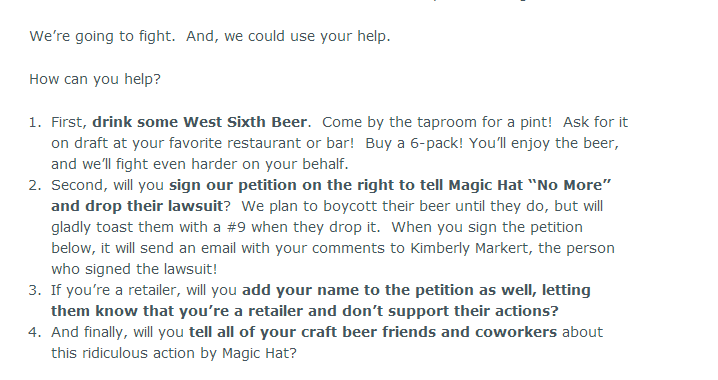Running social media for your company can be an absolute blast. You get to know your customers better and you have the opportunity to increase brand awareness. But sometimes things go wrong and you’re dealing with complaints or issues with a competitor. Before social media, all of that would have been handled privately. Now you’re left with tough decisions on how to deal with it publicly. A few recent events highlight how there’s a wrong way and a right way to handle business on social media.
In one case, two craft brewers tried to hash out their differences online. After a year of negotiations over similar logos, West Sixth took to the Internet to vent about Magic Hat. West Sixth created an entire page on their website dedicated to the issue. “Stop corporate bullying,” they cried, but their attempt to rally their fans just left a bad taste in beer drinkers’ mouths. It was a no-win situation and both breweries looked like jerks. In the end, the conflict wasn’t resolved over social media, it was handled in court, with lawyers.
Not all corporate venting on social media is bad, though. Online magazine Persephone was sued for image copyright infringement along with 70 other defendants. The cost to settle plus legal fees was more than Persephone could afford so they asked for help from their fans on social media. Readers rallied behind them and they were able to raise the money to cover to settle the suit.
When a business owner chooses to air their problems on social media sites, they run the risk of alienating their fans or rallying them. The difference is in what you want your customers to do.
For the small brewery, they were using social media to vent frustration publicly, but their call to action was worthless. You want your fans to drink more of your beer and boycott your competitor. This call to action accomplishes nothing. West Sixth came off looking unprofessional and junior league.

In Persephone’s case, they had a simple call to action: Give them money to fight the case. Their readers knew exactly what was expected of them and how they could help. The tactic worked and they wrote about their experiences and used them to educate bloggers about the dangers of copyright infringement. Persephone ended up with positive public reaction that has boosted their image and increased brand awareness.
It’s okay to use social media to show off the human side of your business. But just like you don’t share everything you do with your next-door neighbor, sometimes it’s better not to share everything with your fans.
